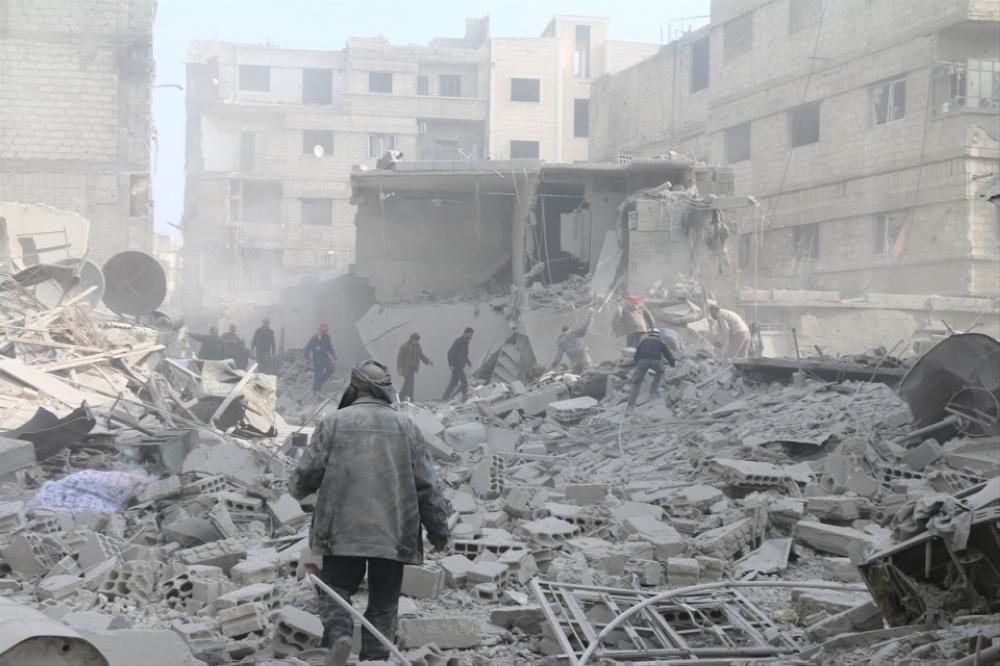As Syrian President Bashar Assad continues solidifying his hold in power around Damascus with the aid of Russian airstrikes, it is becoming clear that the regime will not be able to retake many other parts of the country in the foreseeable future.
All sides in the Syrian conflict are grappling for power amid a complex web of alliances and the latest Turkish invasion into Kurdish areas.
The developments in Syria comes as the U.S. Director of National Intelligence, Dan Coats, released his office’s Worldwide Threat Assessment of the U.S. Intelligence Community, which stated that the conflict in Syria will continue through 2018.
“The conflict has decisively shifted in the Syrian regime’s favor, enabling Russia and Iran to further entrench themselves inside the country. Syria is likely to experience episodic conflict through 2018, even as Damascus recaptures most of the urban terrain and the overall level of violence decreases,” the report said.
The report all but ruled out that the seven-year insurgency by the opposition would be able to topple the Assad regime. It added that Iran and Russia were hunkering down and planning for a long-term presence.
Aron Lund, a Swedish expert on Syria and a fellow at the Century Foundation, told JNS: “The Syria-Iraq violence will probably wind down eventually—not disappear, but wind down. But there’s still a lot of fighting to be done before all sides in Syria have staked their claims.”
Asked what he makes of the current Middle East situation and continuing atrocities in Syria, the former editor of the “Syria in Crisis” special section for the Carnegie Endowment for International Peace replied that attention may shift to other potential crises “once the international community has spent the last of its patience with Syria.”
“Egypt’s slow decay is very worrying to very many, for example. You have other such places of concern, where old regimes are starting to look a little wobbly: Sudan, perhaps Algeria, Tunisia and maybe even Jordan unless its economic woes are addressed,” he said, adding that the Israeli-Palestinian conflict “is not going to be solved anytime soon.”
Putting Syria back together again
Regarding Syria, Lund said it appears that Assad is slowly retaking power throughout most of the country, but there are still enclaves and peripheral regions outside of his control. “Some of them may remain inaccessible to his forces for a long time, perhaps even indefinitely since you have Turkish or American troops there,” he noted.
Lund pointed out that “the war over who should rule in Damascus seems to be over, though I guess one shouldn’t exclude the possibility of some sort of surprise twist, perhaps related to regional developments.”
Concerning Russia and Iranian forces in Syria, Lund said that he would not go as far as saying they control the country, but they obviously are very influential. “Assad is not just a pawn you can move around at will.”
The Syrian regime is “a creaky old machine that is probably pretty hard to run even for Assad, never mind for an outsider,” he explained. And to some extent, he added, “Russia and Iran will also end up balancing each other out in so far as they disagree, which leaves Assad with more room for independent maneuver[ing] between them.”
“Israel is seeking a closer relationship to Russia over Syria,” said Lund. “That, of course, comes with its own strings attached.”
Turkey has become an ‘Islamic Guard’
Meanwhile, in northern Syria, Turkey’s offensive into the Afrin region along the Turkish-Syrian border to drive out Kurdish groups has become bogged down over the last several weeks. At the same time, the Turkish operation has created strained relations with the United States, which has worked alongside Kurds in Syria in their operations against the Islamic State in the northern and eastern parts of the country, adding yet another layer of complexity to the Syrian conflict.
Dr. Kamal Sido, a Syrian Kurd who works at the Middle East desk for the Society for Threatened Peoples, a German human rights NGO, told JNS that if the West and United States allow Turkey to continue attacking and weakening the Kurds in Syria, this will strengthen Iran and the radical Islamists.
“The Turkish army has in fact become an Islamic guard. This army is anti-Western and anti-Israel; the West must wake up,” he asserted.
Moving forward, Sido called on the United States and other Western countries “to put an end to the Turkish army’s attacks against the civilian population in my homeland, the Kurdish region of Afrin.”
He explained that “for weeks, peaceful villages in Afrin have been under attack from all sides by Turkish heavy artillery, missile launchers and tanks—and by Syrian Islamist militias that are supported by the Turkish government.”
At the same time, Lund believes that there appears to be an agreement between Turkey and Russia more or less, with some opining that Turkey’s President Recep Tayyip Erdogan is improvising. “His forces are taking their time, but they are eating their way through Kurdish defenses,” he said.
“Turkey will likely overpower the Kurdish YPG militia eventually unless Assad radically escalates his support to the Kurds or, this is the wild card, Russia steps in with a solution of some sort,” he added.
However, Lund noted that Russia is in a tricky situation since it wants to retain cooperation with Turkey, but is unhappy about the risk of clashes between Damascus and Ankara.
“A Moscow solution could be one that allows Assad to take over the Kurdish areas, reining in the Kurds and letting Turkey direct its fury elsewhere,” said Lund, “perhaps against those Kurdish areas that are under American influence further east.”


























